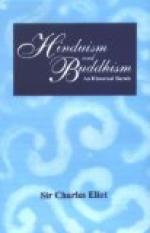Although in Japan Buddhism continued to produce new schools until the thirteenth century, no movement in China attained this status after about 730, and Lamaism, though its introduction produced considerable changes in the north, is not usually reckoned as a Tsung. But numerous societies and brotherhoods arose especially in connection with the Pure Land school and are commonly spoken of as sects. They differ from the schools mentioned above in having more or less the character of secret societies, sometimes merely brotherhoods like the Freemasons but sometimes political in their aims. Among those whose tenets are known that which has most religion and least politics in its composition appears to be the Wu-wei-chiao,[849] founded about 1620 by one Lo-tsu[850] who claimed to have received a revelation contained in five books. It is strictly vegetarian and antiritualistic, objecting to the use of images, incense and candles in worship.
There are many other sects with a political tinge. The proclivity of the Chinese to guilds, corporations and secret societies is well known and many of these latter have a religious basis. All such bodies are under the ban of the Government, for they have always been suspected with more or less justice of favouring anti-social or anti-dynastic ideas. But, mingled with such political aspirations, there is often present the desire for co-operation in leading privately a religious life which, if made public, would be hampered by official restrictions. The most celebrated of these sects is the White Lotus. Under the Yuan dynasty it was anti-Mongol, and prepared the way for the advent of the Ming. When the Ming dynasty in its turn became decadent, we hear again of the White Lotus coupled with rebellion, and similarly after the Manchus had passed their meridian, its beautiful but ill-omened name frequently appears. It seems clear that it is an ancient and persistent society with some idea of creating a millennium, which becomes active when the central government is weak and corrupt. Not unlike the White Lotus is the secret society commonly known as the Triad but called by its members the Heaven and Earth Association. The T’ai-p’ing sect, out of which the celebrated rebellion arose, was similar but its inspiration seems to have come from a perversion of Christianity. The Tsai-Li sect[851] is still prevalent in Peking, Tientsin, and the province of Shantung. I should exceed the scope of my task if I attempted to examine these sects in detail,[852] for their relation to Buddhism is often doubtful. Most of them combine with it Taoist and other beliefs and some of them expect a Messiah or King of Righteousness who is usually identified with Maitreya. It is easy to see how at this point hostility to the existing Government arises and provokes not unnatural resentment.[853]




